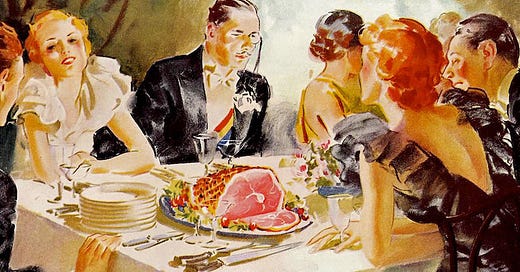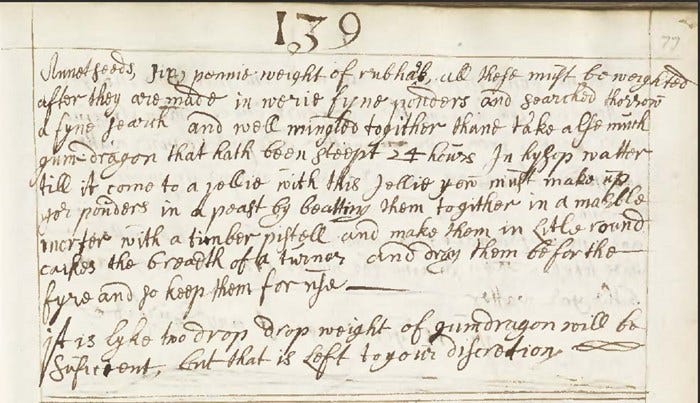From Regency Romance & Queens of Crime to Cough Cures
Via Reading for Comfort, Problematic Classics, Doctor to the Fair Folk and Healing Wells
Dearest Gentle Reader,
It is so wonderful to be writing to you again, I have been ill for some weeks with a particularly revolting chest infection and have had absolutely no energy, creative or otherwise, left after completing my day job. I think I must now be properly on the mend as I have been itching to write to you for a couple of days and a couple of perfect topics occurred to me. Whist I haven’t felt up to writing, I have been soothing myself with reading what I call comfort books, the mystery novels of Agatha Christie and Dorothy L Sayers, and the Regency romances of Georgette Heyer (not her detective novels, the characters are too prickly for comfort).
I’m not sure why these novels are so comforting, perhaps its because they are novels I first read in my teens which makes them feel like a cuddle. The other thing is that all are about worlds which are as far from our current society as can be yet still have a warm familiarity. We know we are going to get exactly what we are expecting. Whilst reading them this time, it has been the glorious food that they contain that has provided a wonderful comfort blanket and a little bit of an obsession.
I haven’t had much energy to cook so have been surviving on things that just go in the oven and items from the picnic fridge section of the supermarket. The ridiculously extravagant foods in these books have been keeping warm the part of my soul that enjoys creativity in the kitchen and loves to have fun with ingredients in the same way that the stories have kept the part of me that loves to write company. I’m hoping a trip to the market for seasonal ingredients next weekend will be the culinary equivalent of this letter, a sort of kickstart to the other important creative part of me.
I’ll give just a taste of these splendid fictional meals starting with Georgette Heyer:
‘There were only a dozen persons present, but nothing could have exceeded the display of plate, or the splendour of the refreshments. The regalia on the sideboard of jellies, creams, and pies made Lydia open her eyes; and she afterwards insisted that she had counted eight dishes a side on the table. The Usselbys might exchange significant glances, but Mr Charles Oversley, forgetful of the indifference befitting a man of mode, ejaculated, as his eyes fell on the table already spread with pies, pates, capons, a glazed ham, and fruit, creams, and jellies past counting: “By Jupiter, this is something like!”’ - A Civil Contract
‘He knew quite as well what to offer a very old lady as how to serve up a grand dinner of two full courses, consisting of half-a-dozen removes and upwards of thirty side dishes. The Dowager, revived by a soup made with fresh peas, allowed herself to be persuaded to try a morsel of turbot; followed this up with several morsels of a delicate fawn, roasted whole, and served with a chevreuil sauce; and ended her repast with a dish of asparagus, cut and delivered by the kitchen-gardener a bare ten minutes before Mr Dawlish was ready to cook it. This was so succulent that she was moved to compliment Kit on his cook.’ - False Colours
‘He partook lavishly of every dish and was so much moved by the excellence of the Davenport fowls, stuffed, parboiled, and stewed in butter, that he sent a complimentary message to the cook and congratulated Carlyon on having acquired such a treasure. By the time he had worked his way from the Hessian soup and ragout which began the repast through a baked carp dressed in the Portuguese way, some beefsteaks with oyster sauce, the fowls, and a floating island, with a fruit pie as a remove, he was so far reconciled to his nephew’s death as to be able to recount three of the latest good stories circulating town and to confide to Carlyon as he ecstatically savoured the bouquet of the port, that he really could not agree with his old friend Brummell in deeming it a wine only fit for the lower orders to drink.’ - The Reluctant Widow
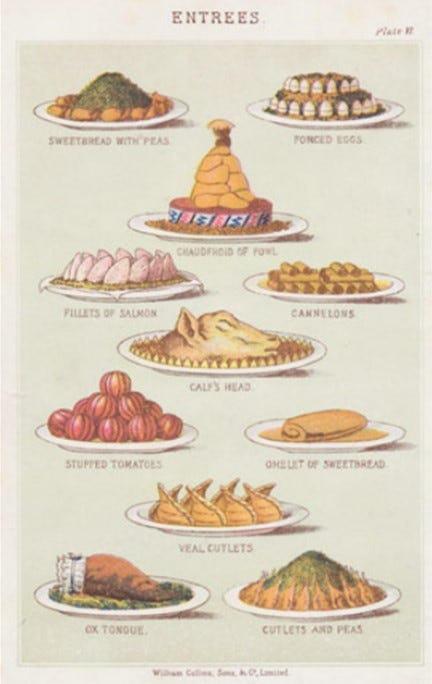
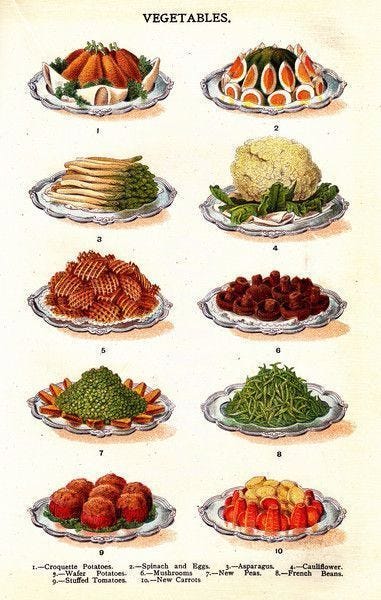
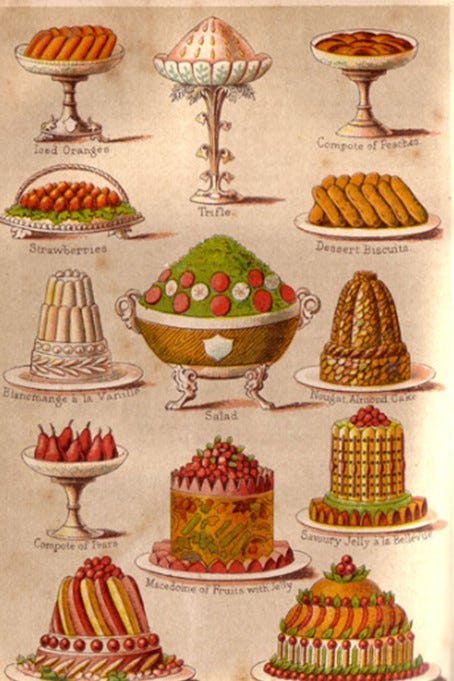
Now we’ll hear from Agatha Christie:
“On the sideboard were half a score of heavy silver dishes, ingeniously kept hot by patent arrangements.
“Omelet,” said Lord Caterham, lifting each lid in turn. “Eggs and bacon, kidneys, devilled bird, haddock, cold ham, cold pheasant. I don’t like any of these things, Tredwell. Ask the cook to poach me an egg, will you?” - The Secret of Chimneys
“Your last supposition is the correct one. I have come into money, and the shock has been too much for me! For that particular form of mental trouble an eminent physician recommends unlimited hors d’oeuvre, lobster à l’americaine, chicken Newberg, and Pêche Melba! Let’s go and get them!” - The Secret Adversary
“Miss Marple inserted a knife gingerly but with confidence. She was not disappointed. Rich deep yellow yolk oozed out, thick and creamy. Proper eggs!” - At Bertram’s Hotel
“Sardine sandwiches as well as the tomato ones. And some of those little scones you make so nicely. And I’d like you to make that special cake of yours. “Yes. It is rich. For it I have nothing! Impossible to make such a cake. I need for it chocolate and much butter, and sugar and raisins.”
“You can use this tin of butter that was sent us from America. And some of the raisins we were keeping for Christmas, and here is a slab of chocolate and a pound of sugar.”
Mitzi’s face suddenly burst into radiant smiles.
“So, I make him for you good,” she cried, in an ecstasy. “It will be rich, rich, of a melting richness! And on top I will put the icing, chocolate icing I make him so nice, and write on it Good Wishes.” - A Murder Is Announced
I’ll finish with Dorothy L Sayers who it was said, only chose to write about a rich, upper class detective to give herself the opportunity to describe the type of foods she was longing to eat in a time when she herself was very short of money. Lord Peter lived in the style that she wished to become accustomed:
“You show the right spirit,” said Wimsey. “I will compose a dinner for you.” He called the head waiter, and went into the question scientifically.
“Huitres Musgrave, I am opposed on principle to the cooking of oysters but it is a dish so excellent that one may depart from the rules in its favour. Fried in their shells, Miss Dorland, with little strips of bacon. Shall we try it? The soup must be tortue vraie, of course. The fish? oh! just a filet de sole, the merest mouthful, a hyphen between the prologue and the main theme.
“That all sounds delightful. And what is the main theme to be?”
“I think a faisan rôti with pommes Byron. And a salad to promote digestion. And, waiter, be sure the salad is dry and perfectly crisp. A soufflé glacé to finish up with. And bring me the wine-list.” - The Unpleasantness at the Bellona Club
These books have been perfect for me during my illness, I have escaped to the heights of society in Regency London, London between the World Wars and rural England at any time between the 1920s and 50s. I have danced dances long since forgotten, eaten dishes no longer eaten, visited places that no longer exist and in fact may never have existed outside of the author’s imagination. I have puzzled over clues and manners and unfamiliar words and have essentially lived in fantasy worlds.
I do have a caveat though: I think I must acknowledge some of the more problematic language and ideas that also exist in these books. There are definitely jarring moments now, that when I first read them definitely weren’t so noticeable, perhaps because as an adult I am more aware of the author’s prejudices and recognise their damaging ideas and instead of absorbing them uncritically whilst enjoying the plot, try to use them to help me engage better with cultural diversity.
I also think that it is important that we use these books to draw attention to how our society has changed as well as how far we have to go. Times have changed to an extent, thank goodness, and reading these books with a critical eye means we can enjoy the elements of these works that have made them long outlive their authors whilst understanding that they also contain ideas that we have to fight against. That isn’t quite enough though, I feel that as well as classic fiction we must also seek out books by those people who did not have a voice in 1920s, 1930s or even 1974 and absorb their stories and ideas, hear their histories.
Apologies for the mini lecture, there are very strong arguments for either side of this debate and everyone should do exactly as they see fit. This is just my own personal take, I might feel differently perhaps if any of these authors were alive and profiting from their works or I was one of the people who was on the receiving end of the racism, anti-semitism or colonialism.
In addition to these notes and thoughts from my sick bed, I have a short folktale about curing sickness for you too which was contributed by Marilyn McPhie to an online collection.
Many years ago in the Spey Valley, there lived a notable woman. Some called her a witch, but if that was true, she was a witch of the very best kind. She was called Dame Aliset, and she had great skill and knowledge. She could predict the weather. And, with little more difficulty, she could also predict the future. She could tell people where to find hidden or forgotten treasures. She could care for animals, which seemed to recognize her skillful touch and sympathy. She could advise young women and men about their prospects for marriage and once they were married, she could give good advice on how to maintain happy relations.
All of these skills were much valued and much in demand among all who lived nearby, and even miles away. But by far the most valued of Dame Aliset’s skills was in curing the sick. Fevers, broken bones, all manner of ailments were treated with herbs, potions, and words of healing power.
One night, in the very middle of the night, there was a knock on the door of Dame Aliset’s cottage. This was by no means an unusual occurrence. The woman arose, lit a candle, and opened the door. There she saw a tiny man, no taller than five feet high, wearing old-fashioned clothing, and holding the reins of two ponies. She greeted the man and asked what he wanted. He explained that his mistress had sent him to fetch her, as her child was very ill.
Dame Aliset dressed quickly, asked a few questions about the child who required her care, and she began to pack a basket with items she might need. Then she set off on one of the ponies, with the little man on the other. As they headed down the lane, Dame Aliset explained that they would need to stop briefly at the Well of Healing for water to fill an empty flask she had brought along. When they reached the well, the little man dismounted and courteously filled the flask for her. As he was thus occupied, Dame Aliset picked a bunch of rowan flowers nearby and tucked them into the bodice of her dress. She had guessed who the little man’s mistress was and what she had been sent for, and she knew that rowan blossoms would be of help.
They rode along for a time and finally came to the fairy hill beside the river, and the two of them entered. Dame Aliset was greeted by a magnificent creature, the queen of the fairies, whose dazzling beauty was only diminished by the look of grave concern on her face. She led the woman to her daughter, who was lying on a bed of fur. The child was moaning and tossing and had a high fever.
Dame Aliset went to work at once. She mixed some of the herbs she had brought with some of the water from the Well of Healing and had the child drink a cupful. Then she instructed the fairy queen to bathe her daughter with more of the precious water. After a time, a second dose of the healing potion was administered, and later a third. Finally, the girl fell into a comfortable sleep, her fever gone and her skin cool.
“She’ll do now,” declared Dame Aliset, and she prepared to leave, giving a few instructions for follow-up care.
The fairy queen was relieved and grateful, of course, and so were all of the little people. They surrounded Dame Aliset and offered her splendid gifts of all kinds to repay her for her service, but Dame Aliset just smiled and refused to take anything. “If you really wish to give me a gift, you can give me the gift of your friendship. That would surely be gift enough.”
The little people assured her that they would always consider her a dear friend, but in addition, they said they’d offer an extra gift to Dame Aliset and anyone she told. The gift was that if anyone washed in the waters of the spring that fed the Well of Healing, that person would be youthful and beautiful forever. It is said that the waters of that well still possess the gift that was given to Dame Aliset that day.
I shared this story because it was said that the Well of Healing that is described here was actually St Mary’s Well or Well of Spey in Orton, Speyside. The location of the well is close to one of the ancient crossing points of the Spey at Boat o’ Brig, which leads into Glen Orchill on the road to Keith. It has a reputation which carried on into the twentieth century for curing chest complaints and whooping cough in particular. It is described as ‘a gem for the serious well finder with a sense of adventure’.
It is also a long way away, so I thought I would look up some other remedies held in the National Museum of Scotland. I don’t fancy Vinegar of Squills much: "Take of the roots of Squills (a Mediterranean herb of the lily family), cut small, and moderately dry, one pound; best vinegar, three quarts; let them stand to infuse in the sun, as was ordered of vinegar of roses, and afterwards press and strain off the liquor. " but the following from the Women’s Recipe Book is a little more appetising
"Take halfe a pound of double Refyned Sugar one ounce of liquorish, two ounces of orris roots, three ounces of Sugar pellets, one ounce of Elecampane, one ounce of Aniseed, Six pennie weight of Rhubarb, all those must be weighted after they are made in very fyne powders and sieved through a fine sieve and well mingled together then take also much gum dragon (gum from dried sap) that hath been steeped 24 hours in hysop watter till it come to a jelly with this you must make up your powders in a paste by beatting them together in a marble mortar with a timber and make then in Little round cakes the breadth of a turnor and dry them before the fire and so keep them for use."
I’m not sure I could source all the ingredients though, so I will stick with my mullein flower and lemon verbena tea I think.
I must now bring this letter to a close. Please don’t hesitate however, to get in touch via the comments via any of my social media profiles/my website . If you have enjoyed this and would like to read further such nonsense and have not yet subscribed, please don’t hesitate to subscribe for free at the button below. You’d be very welcome and it would be a joy to write to you.

